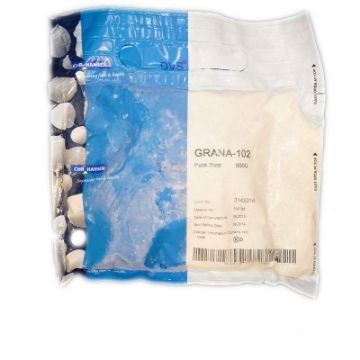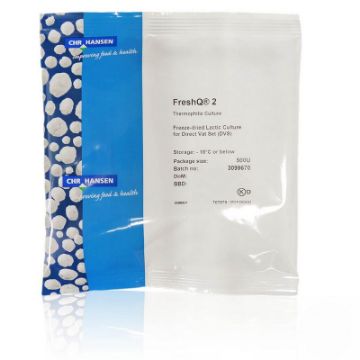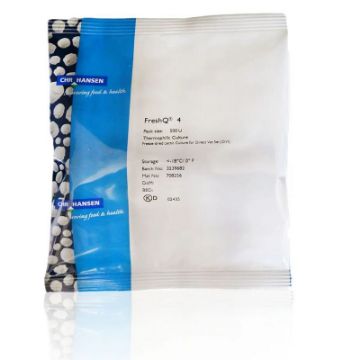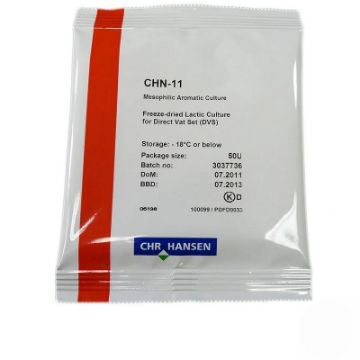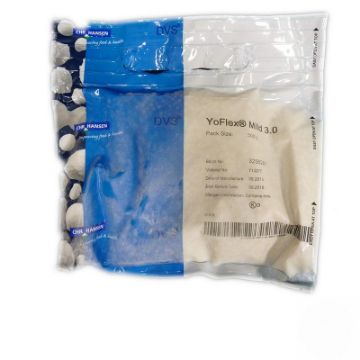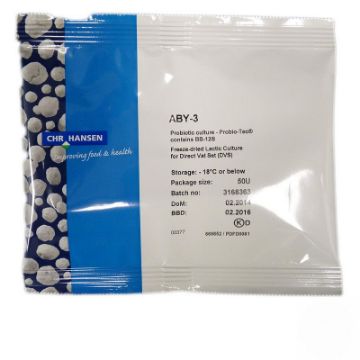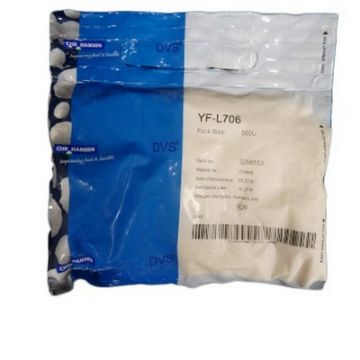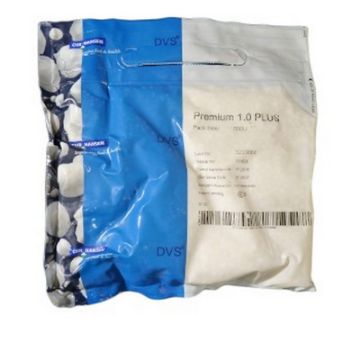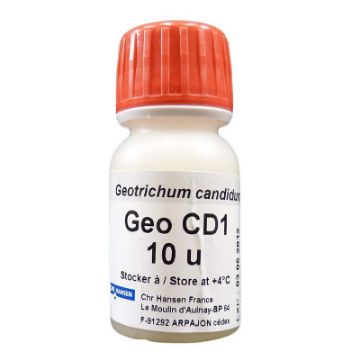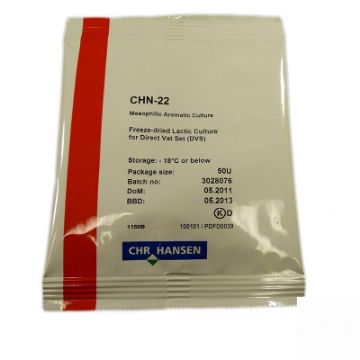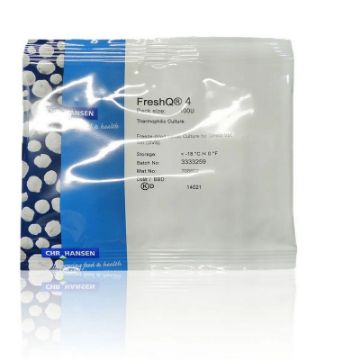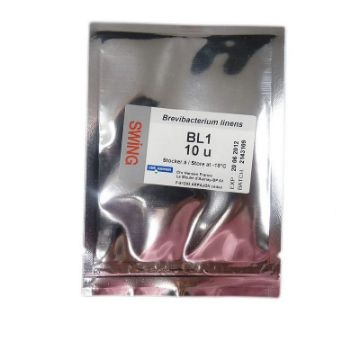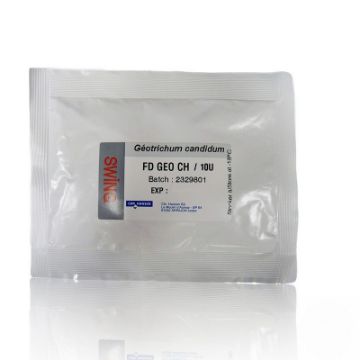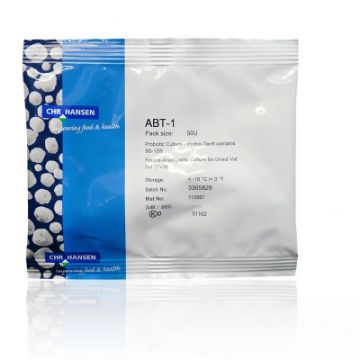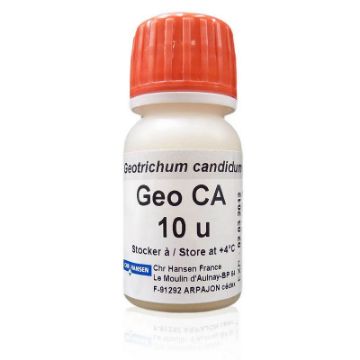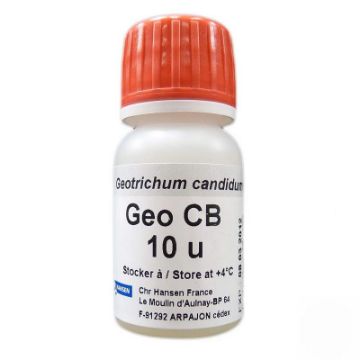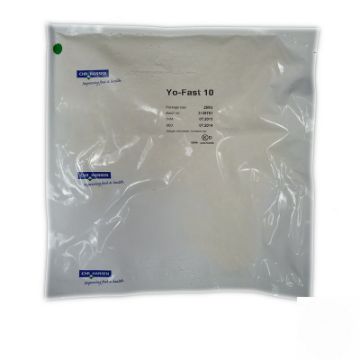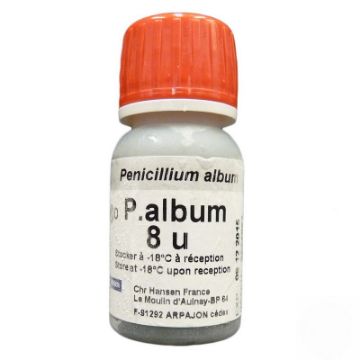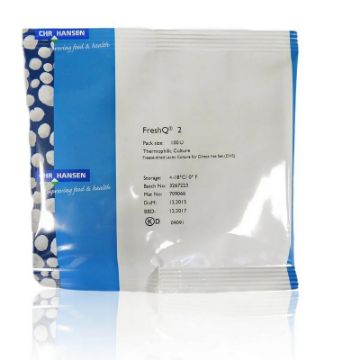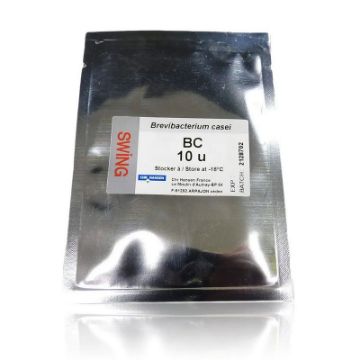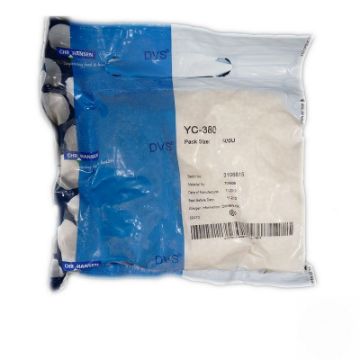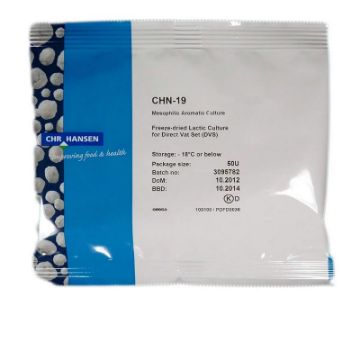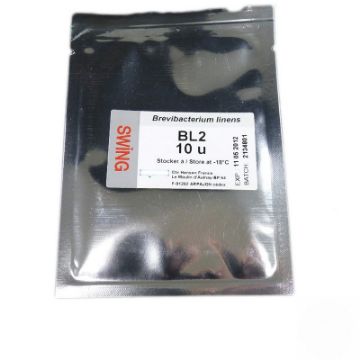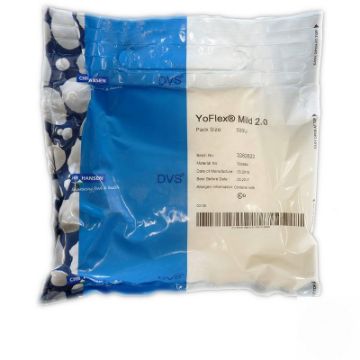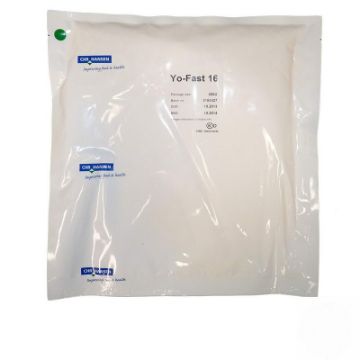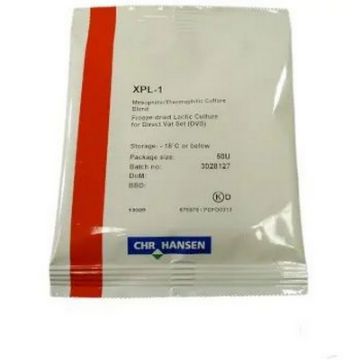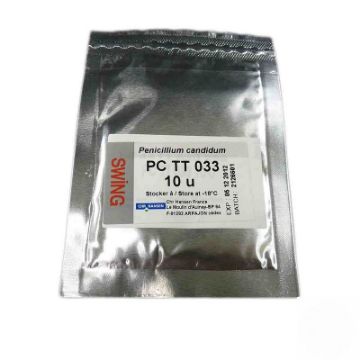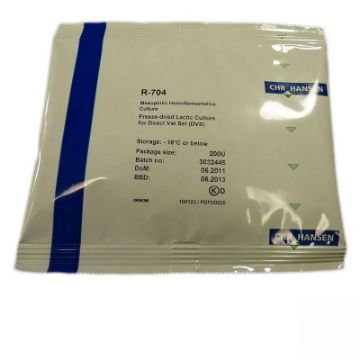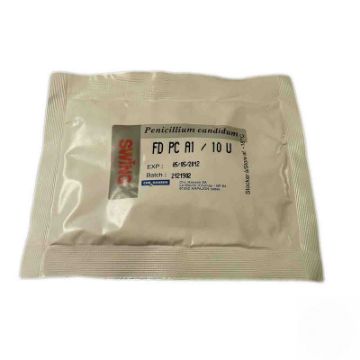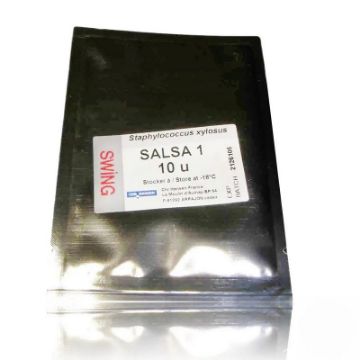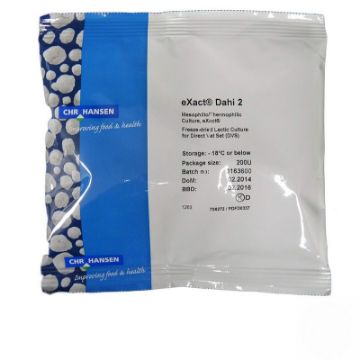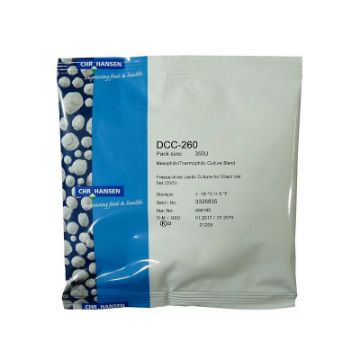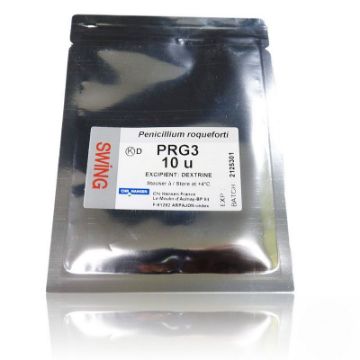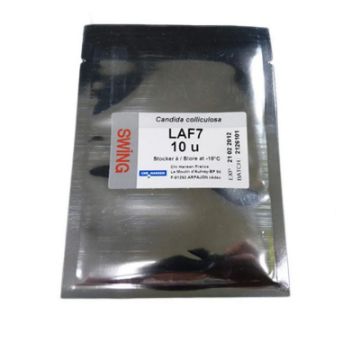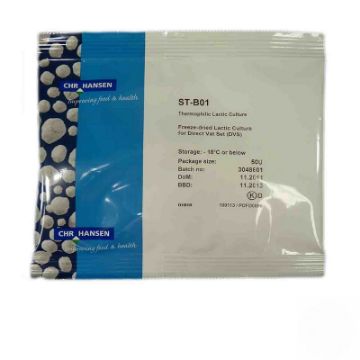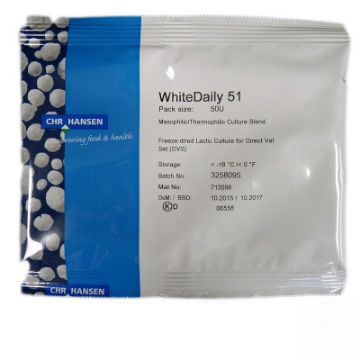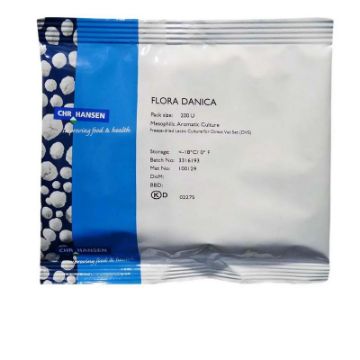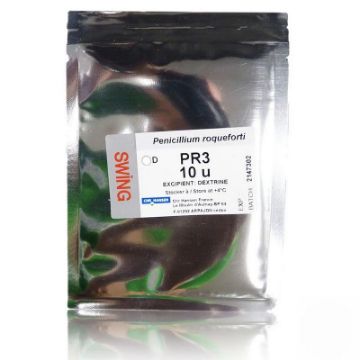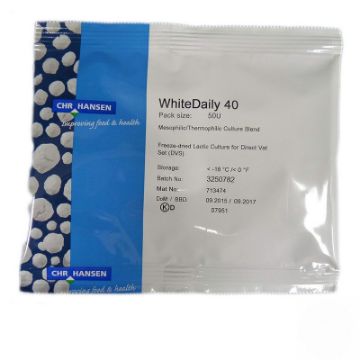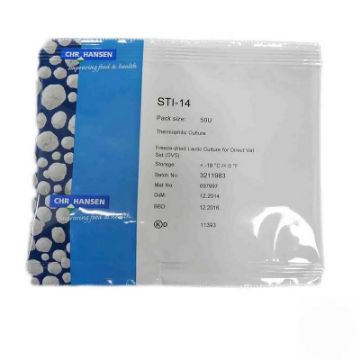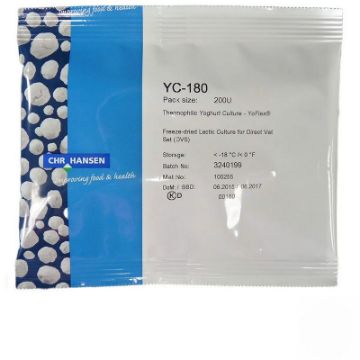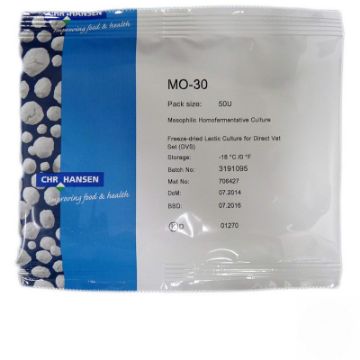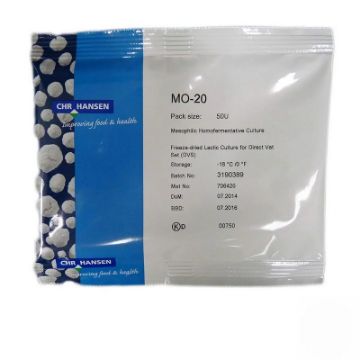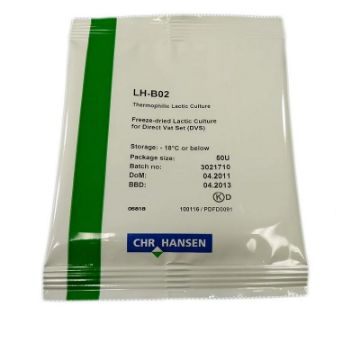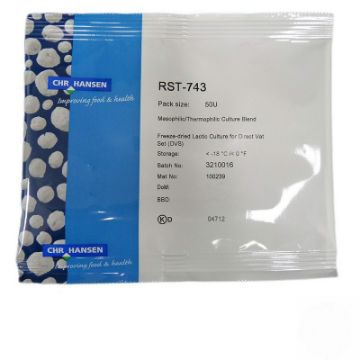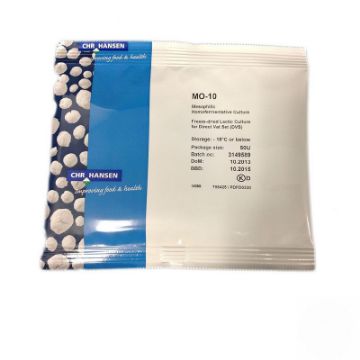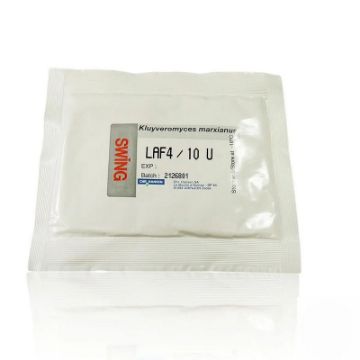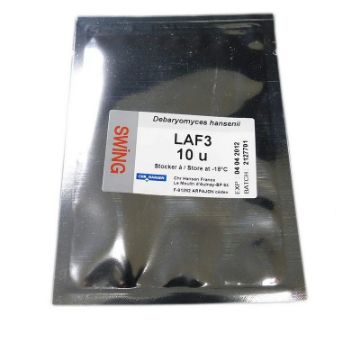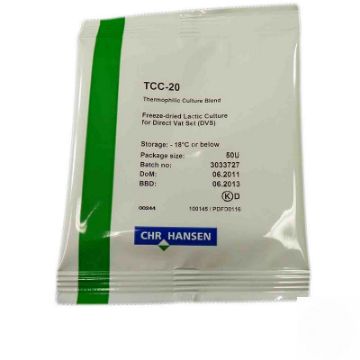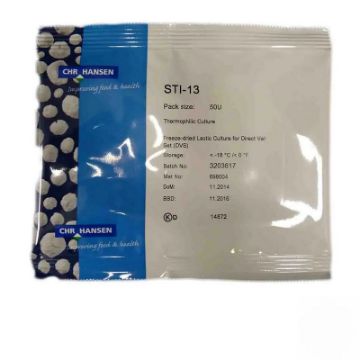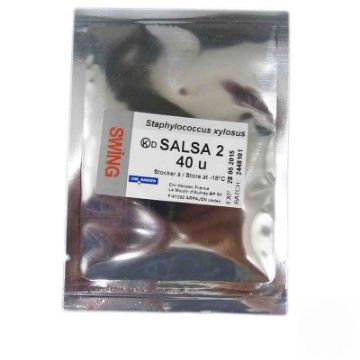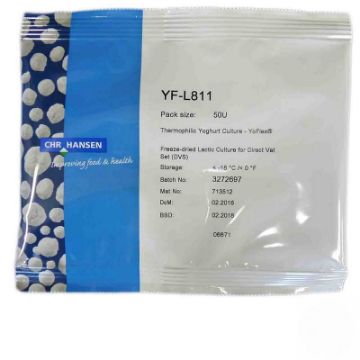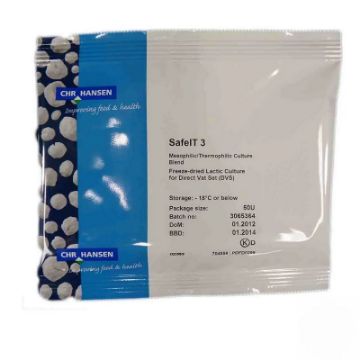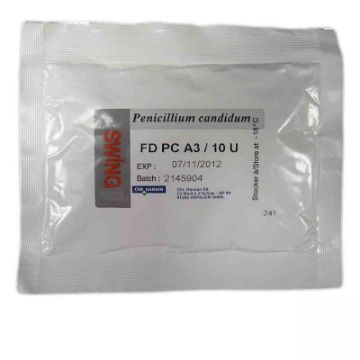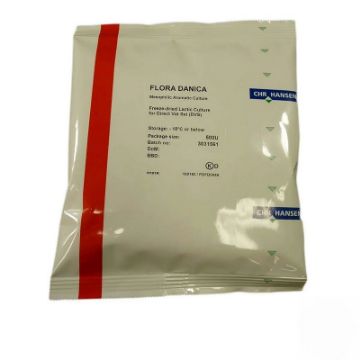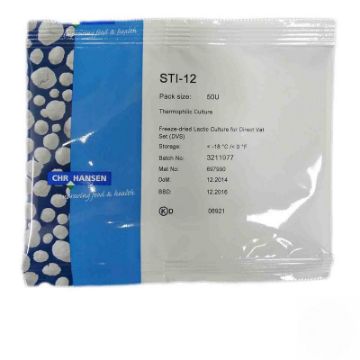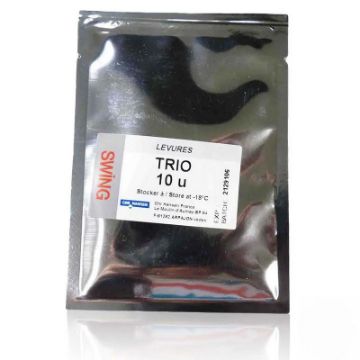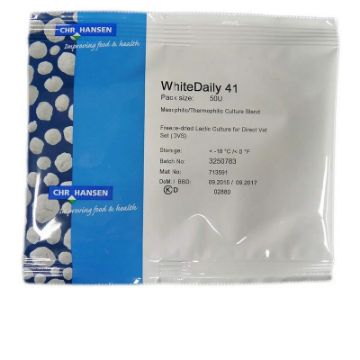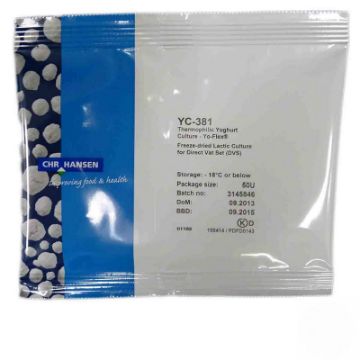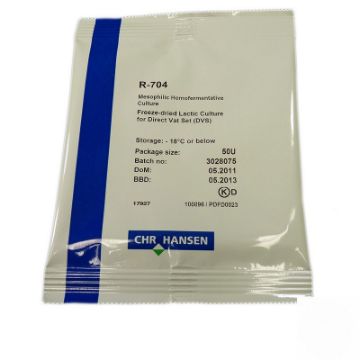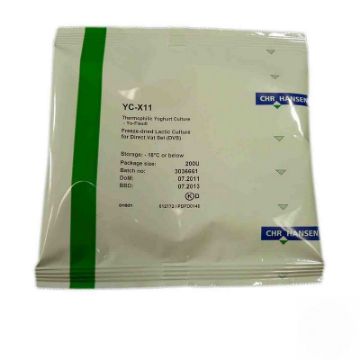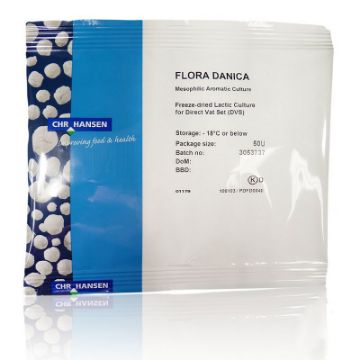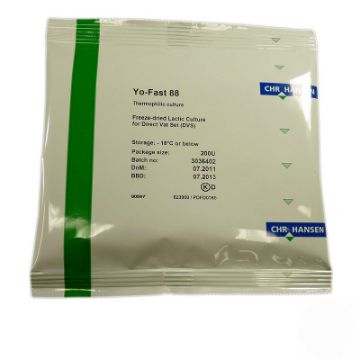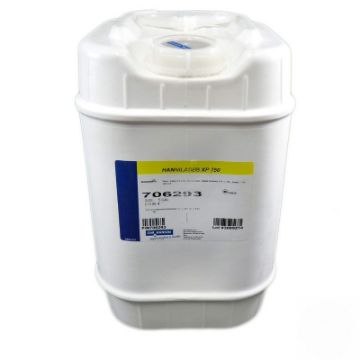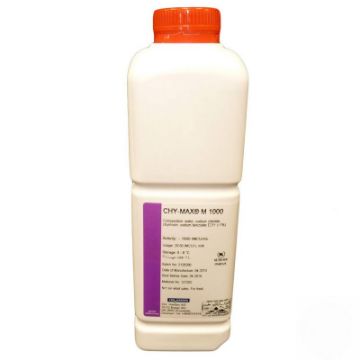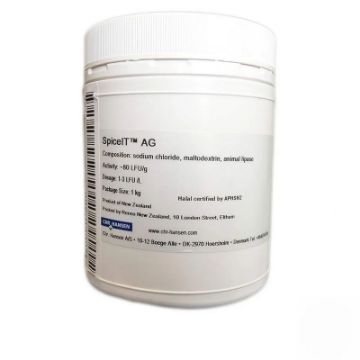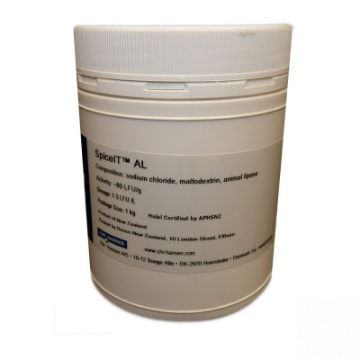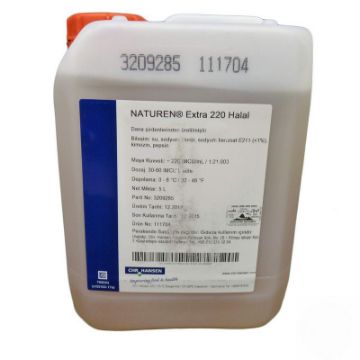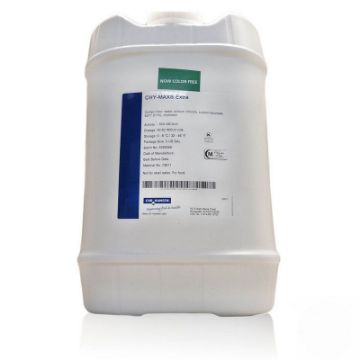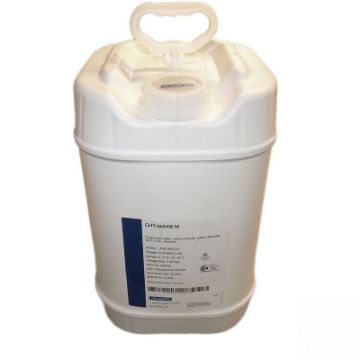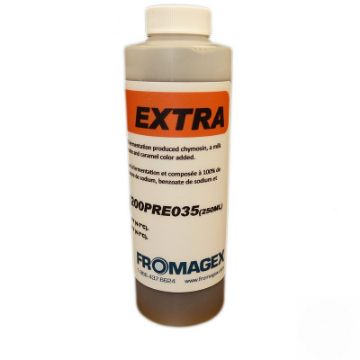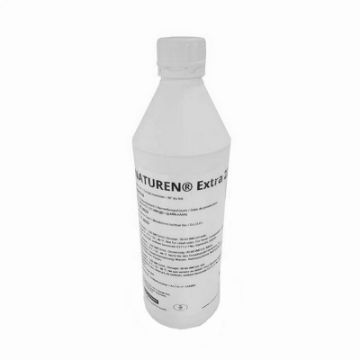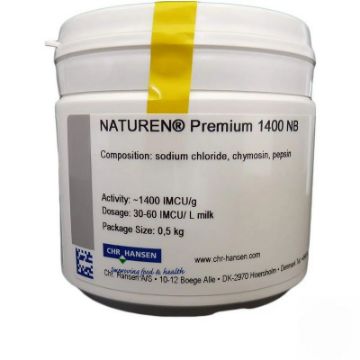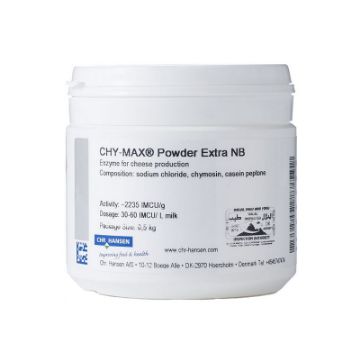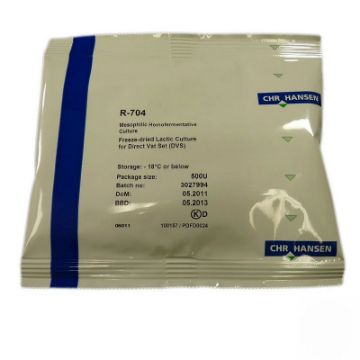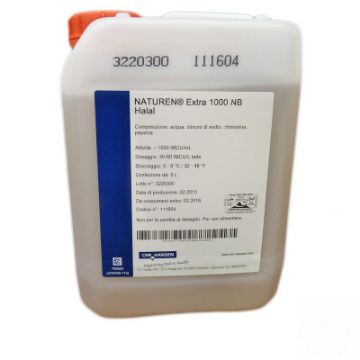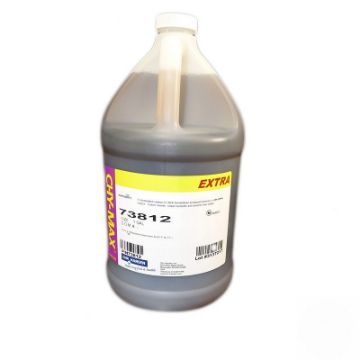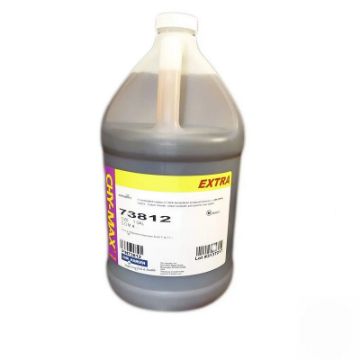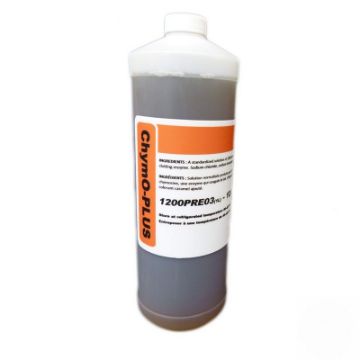Chr Hansen
GRANA-102 Frozen 500 u
This Chr.Hansen DVS® culture contains defined thermophilic and mesophilic strains and is for continous direct vat set use.
The culture provides fast lactic acid production, high phage robustness and a profound flavor and texture contribution.
The culture is primarily applied in the production of hard cheese varieties (e.g.Parmesan, Reggianito, Sardo, Goya and Roomy), which are characterized by a compact and granular texture.
The culture provides a complex, mature cheese flavor with sweet, fruity and nutty notes.
FreshQ 2 Freeze-dried 500 u
The FreshQ® cultures are combinations of traditional lactic acid bacteria that deliver inhibition of unwanted yeast and moulds in fermented dairy products.
The effect is obtained through active participation in the natural fermentation.
The cultures are added in combination with the normal starter culture in the production of fermented dairy products.
The cultures are developed for application in e.g. Fresh cheese, yoghurt, sour cream.
FreshQ 4 Freeze-dried 500 u
The FreshQ® cultures are combinations of traditional lactic acid bacteria that deliver inhibition of unwanted yeast and moulds in fermented dairy products.
The effect is obtained through active participation in the natural fermentation.
The cultures are added in combination with the normal starter culture in the production of fermented dairy products.
The cultures are developed for application in e.g. Fresh cheese, yoghurt, sour cream.
CHN-11 Freeze-dried 50 u
Mesophilic aromatic culture, type LD.
The culture produces flavor and CO2.
This range provides cultures with fast acidification properties at a low inoculation rate.
The culture is primarily used in the manufacturing of Continental semi-hard cheese varieties with eyes, e.g. Gouda, Edam, Leerdam and Havarti.
Vega Harmony Frozen 500 u
This culture has been produced without the use of dairy derived ingredients in any part of the production steps.
The culture is manufactured in an environment where dairy ingredients are handled.
The culture is used in the production of drinking, stirred or set fermented products made from dairy alternatives.
The dairy alternative base should have a pH ?
7 to ensure sufficient activity of the culture and it should contain enough fermentable sugar to reach pH 4.5 in the final product.
Fermentation temperature should be 38°C – 43 °C.
The final product should be stored at 8 °C.
The maximum shelf life of the final product is 60 days at 4 °C or 28 days at 8 °C.
Y-MILD 3.0 Frozen 500 u
Thermophilic YoFlex® culture.
The culture will produce yogurt with very mild flavor, extra high viscosity and very low post-acidification.
Suitable for stirred and drinking yogurt.
The culture is ideal for manufacturing of Greek yogurt.
ABY-3 Freeze-dried 50 u
Thermophilic lactic acid culture.
Contains the documented probiotic strains BB-12 ® and LA-5®.
The strains have a long history of safe use.
The culture will produce yoghurt or fermented milk with high body, very mild flavor and very low post-acidification.
Suitable for cup set, stirred and drinking yoghurt.
YF-L706 Frozen 500 u
Thermophilic YoFlex® culture.
The culture will produce yoghurt with very mild flavor, very high viscosity and very low post-acidification.
Suitable for cup set, stirred and drinking youghurt.
PREMIUM 1.0 PLUS Frozen 500 u
Thermophilic YoFlex® culture.
The culture will produce yoghurt with mild flavor, extra high viscosity and low post-acidification.
Suitable for stirred and set yoghurt.
The culture is ideal for manufacturing of Greek yogurt.
GEO CD 1 Swing Liquid 10 u (Box of 6 pouches)
A selected single strain ripening culture with origin in traditional French cheese making.
The SWING® GEO cultures contributes to the flavor, texture, and appearance of cheese.
The culture is available as a conidia suspension.
The culture may be used in production of many types of cheeses including white mold surface (e.g.Camembert type), smeared and mixed rind, soft and semi-hard, and blue mold cheeses.
Vega Mild Frozen 500 u
Thermophilic lactic acid culture.
This culture has been produced without the use of dairy derived ingredients in any part of the production steps.
The culture is manufactured in an environment where dairy ingredients are handled.
The culture is used in the production of yoghurt products such as drinking or stirred, made from dairy alternatives.
CHN-11 Freeze-dried 500 u
Mesophilic aromatic culture, type LD.
The culture produces flavor and CO2 .
This range provides cultures with fast acidification properties at a low inoculation rate.
The culture is primarily used in the manufacturing of Continental semi-hard cheese varieties with eyes, e.g. Gouda, Edam, Leerdam and Samsoe.
CHN-22 Freeze-dried 50 u
Mesophilic aromatic culture, type LD.
The culture produces flavor and CO2.
This range provides cultures with fast acidification properties at a low inoculation rate.
The culture is primarily used in the manufacturing of Continental semi-hard cheese varieties with eyes, e.g. Gouda, Edam, Leerdam and Havarti.
FreshQ 4 Freeze-dried 100 u
The FreshQ® cultures are combinations of traditional lactic acid bacteria that deliver inhibition of unwanted yeast and moulds in fermented dairy products.
The effect is obtained through active participation in the natural fermentation.
The cultures are added in combination with the normal starter culture in the production of fermented dairy products.
The cultures are developed for application in e.g. Fresh cheese, yoghurt, sour cream.
Vega Vibe Frozen 500 u
This culture has been produced without the use of dairy derived ingredients in any part of the production steps.
The culture is manufactured in an environment where dairy ingredients are handled.
The culture is used in the production of drinking, stirred or set fermented products made from dairy alternatives.
The dairy alternative base should have a pH ?
7 to ensure sufficient activity of the culture and it should contain enough fermentable sugar to reach pH 4.5 in the final product.
Fermentation temperature should be 38°C – 43 °C.
The final product should be stored at 8 °C.
The maximum shelf life of the final product is 60 days at 4 °C or 28 days at 8 °C.
BL-1 Swing Freeze-dried 10 u
A selected single strain culture with origins in traditional cheese making.
Brevibacterium is one of the most important surface bacteria for its role in coloring the surface of the cheese, and producing flavor.
The culture may be applied in the production of smeared soft and semi-hard cheeses, mold soft cheese, or mixed rind cheeses.
GEO CH Swing Freeze-dried 10 u
A selected single strain ripening culture with origin in traditional French cheese making.
The SWING® GEO cultures contributes to the flavor, texture, and appearance of cheese.
The culture is available as a conidia suspension.
The culture may be used in production of many types of cheeses including white mold surface (e.g.Camembert type), smeared and mixed rind, soft and semi-hard, and blue mold cheeses.
ABT-1 Freeze-dried 50 u (Box of 30 pouches)
Thermophilic lactic acid culture.
Contains the documented probiotic strains BB-12 ® and LA-5®.
The strains have a long history of safe use.
The culture will produce a fermented milk with high body, mild flavor and minimal post-acidification.
Suitable for cup set, stirred and drinking yoghurt.
YC-470 Frozen 500 u
Thermophilic YoFlex® culture.
The culture will produce yoghurt with very strong flavor, medium viscosity and high post-acidification.
Suitable for cup set, stirred and drinking yoghurt.
Vega Boost LH Frozen 250 u
The culture is designed to be used as an adjunct, in combination with a Vega™ starter or probiotic culture, in production ofthe fermented plant-based alternatives.
Vega™ Boost LH has been carefully selected for its potential to improve acidification time, and has effect on taste and flavor.
The effect is base dependent and cannot be generalized.
The culturecan be used as a single adjunct culture, or combined with other Vega™ Boost cultures.
GEO CA Swing Liquid 10 u
A selected single strain ripening culture with origin in traditional French cheese making.
The SWING® GEO cultures contributes to the flavor, texture, and appearance of cheese.
The culture is available as a conidia suspension.
The culture may be used in production of many types of cheeses including white mold surface (e.g.Camembert type), smeared and mixed rind, soft and semi-hard, and blue mold cheeses.
GEO CB Swing Liquid 10 u
A selected single strain ripening culture with origin in traditional French cheese making.
The SWING® GEO cultures contributes to the flavor, texture, and appearance of cheese.
The culture is available as a conidia suspension.
The culture may be used in production of many types of cheeses including white mold surface (e.g.Camembert type), smeared and mixed rind, soft and semi-hard, and blue mold cheeses.
YO-FAST 10 Frozen 250 u
The Yo-Fast® series contains blended strains in a concentrated frozen pellet form to produce yoghurt with unique flavor and body characteristics.
The culture will produce a fermented milk with very high body, mild flavor and minimal/medium post-acidification.
Suitable for stirred, drinking and frozen yoghurt.
SWING Botanic P. Album 1 u
Selected mold strain with origin in traditional cheese making.
SWING® P.
Album is a ripening tool for mold cheeses used for its role in coloring the surface and contributing to the flavor and texture.
P.
Album can be used in soft cheese and lactic cheese.
FreshQ 2 Freeze-dried 100 u
The FreshQ® cultures are combinations of traditional lactic acid bacteria that deliver inhibition of unwanted yeast and moulds in fermented dairy products.
The effect is obtained through active participation in the natural fermentation.
The cultures are added in combination with the normal starter culture in the production of fermented dairy products.
The cultures are developed for application in e.g. Fresh cheese, yoghurt, sour cream.
Vega Boost LP Frozen 250 u
The culture is designed to be used as an adjunct, in combination with a Vega™ starter or probiotic culture, in production of the fermented plant-based alternatives.
Vega™ Boost LP has been carefully selected for its potential to improve acidification time, and has effect on taste and flavor.
The effect is base dependent and cannot be generalized.
The culture can be used as a single adjunct culture, or combined with other Vega™ Boost cultures.
BC Swing Freeze-dried 10 u
A selected single strain culture with origins in traditional cheese making.
Brevibacterium is one of the most important surface bacteria for its role in coloring the surface of the cheese, and producing flavor.
The culture may be applied in the production of low fat soft and semi-hard cheeses, soft cheeses with hard cores, or Mozzarella.
YC-380 Frozen 500 u
Thermophilic YoFlex® culture.
The culture will produce yoghurt with strong flavor, medium viscosity and some post-acidification.
Suitable for cup set, stirred and drinking yoghurt.
CHN-19 Freeze-dried 50 u
Mesophilic aromatic culture, type LD.
The culture produces flavor and CO2.
This range provides cultures with fast acidification properties at a low inoculation rate.
As a principal rule 1000 U of freeze-dried DVS cultures will correspond to 100 l of active bulk starter.
However, specific usage rates should be determined experimentally before a new application.
BL-2 Swing Freeze-dried 10 u
A selected single strain culture with origins in traditional cheese making.
Brevibacterium is one of the most important surface bacteria for its role in coloring the surface of the cheese, and producing flavor.
The culture may be applied in the production of smeared soft and semi-hard cheeses, mold soft cheese, or mixed rind cheeses.
Vega Premium Frozen 500 u
This culture has been produced without the use of dairy derived ingredients in any part of the production steps.
The culture is manufactured in an environment where dairy ingredients are handled.
The culture is used in the production of drinking, stirred or set fermented products made from dairy alternatives.
The dairy alternative base should have a pH ?
7 to ensure sufficient activity of the culture and it should contain enough fermentable sugar to reach pH 4.5 in the final product.
Fermentation temperature should be 38°C – 43 °C.
The final product should be stored at 8 °C.
The maximum shelf life of the final product is 60 days at 4 °C or 28 days at 8 °C.
ABY-3 Freeze-dried 500 u
Thermophilic lactic acid culture.
Contains the documented probiotic strains BB-12 ® and LA-5®.
The strains have a long history of safe use.
The culture will produce yoghurt or fermented milk with high body, very mild flavor and very low post-acidification.
Suitable for cup set, stirred and drinking yoghurt.
Y-MILD 2.0 Frozen 500 u
The culture will allow the production of yogurt with a very sweet aromatic intensity, a very high viscosity and a very weak post-acidification.
Applicable for stirred and drinking yogurts.
This crop is ideal for manufacturing Greek yogurts.
Vega Boost PA Frozen 250 u
The culture is designed to be used as an adjunct, in combination with a Vega™ starter or probiotic culture, in production of the fermented plant-based alternatives.
Vega™ Boost PA has been carefully selected for its potential to improve acidification time, and has effect on taste and flavor.
The effect is base dependent and cannot be generalized.
The culture can be used as a single adjunct culture, or combined with other Vega™ Boost cultures.
XPL-1 Freeze-dried 50 u
Blend of mesophilic aromatic eXact® culture, type LD and thermophilic culture.
The eXact-Plus culture produces texture, flavor and CO2.
Manufacturing of the following fermented milk products:
- Kefir type products
- Crème fraiche/sour cream Fermented milks produced with XPL cultures will have extra high texture, high flavor and medium CO2.
YF-L903 Freeze-dried 200 u
Thermophilic YoFlex® culture.
The culture will produce yoghurt with very mild flavor, extra high viscosity and very low post-acidification.
Suitable for cup set, stirred and drinking yoghurt.
TT033 Swing Freeze-dried 10 u
Selected mold strains with origin in traditional cheese making.
SWING® PC culture is an essential ingredient in the ripening process of white mold cheeses for its role in coloring the surface of the cheese, and contributing to the flavor and texture, as well as protection against contaminants.
The strains may be used on soft cheese with lactic features, camembert/brie types, Tomme, UF soft cheeses, stabilized soft cheeses and soft cheese with rennet features.
R-704 Freeze-dried 200 u
Mesophilic homofermentative culture, type O.
This Chr.Hansen culture range provides phage resistant defined strains for continuous Direct Vat Set (DVS) use.
This culture contains specially selected strains chosen for their phage resistance and ability to produce lactic acid quickly.
This culture does not produce CO2 .
The culture is primarily applied in the production of cheeses with a closed texture, e.g. Cheddar, Feta and Cottage cheese.
The culture can be applied in other fermented dairy products, in combination or not with other lactic cultures.
PCA1 Swing Freeze-dried 10 u
Selected mold strains with origin in traditional cheese making.
SWING® PC culture is an essential ingredient in the ripening process of white mold cheeses for its role in coloring the surface of the cheese, and contributing to the flavor and texture, as well as protection against contaminants.
The strains may be used on soft cheese with lactic features, camembert/brie types, Tomme, UF soft cheeses, stabilized soft cheeses and soft cheese with rennet features.
SALSA 1 Swing Freeze-dried 10 u
A selected single strain ripening culture with origins in traditional cheese making.
SALSA is used to flavor cheeses where sulphur/traditional raw milk cheese aroma is desired.
The culture may also be used to affect texture or for coloring the surface of smeared cheeses.
La culture peut être utilisée dans la fabrication de tous types de fromages à croûtes lavées (morgées) ou mixtes.
elle contribue à assouplir la pâte et à réduire le temps d'affinage.
FD-DVS eXact Dahi 2 Freeze-dried 200 u
Blend of thermophilic and mesophilic culture, type MT.
The culture produces flavor and acidity.
The culture will produce a fermented milk with body, flavor and low post-acidification.
Suitable for Dahi.
DCC-260 Freeze-dried 350 u
Aromatic culture blend.
The DCC culture range provides cultures with very fast acidification properties at a low inoculation rate.
The culture produces flavor and CO2.
The culture is primarily used in the manufacturing of Dutch and Continental semi-hard cheese varieties with eyes, e.g. Gouda and Edam.
PR G3 Swing Freeze-dried 10 u
A selected single strain ripening culture with origin in traditional Italian cheese making.
SWING® PRG cultures are specially selected for use in Gorgonzola cheese.
The culture contributes to the characteristic flavor, texture, and appearance of cheese.
The cultures have been specially selected to meet the technological requirements for the gorgonzola cheese process.
It may also be used in modern blue types to obtain a well balanced light flavor.
LAF 7 Swing Freeze-dried 10 u
Selected yeast single strain with origin in traditional French cheese making.
SWING® LAF cultures are an important tool in cheese making since they may be used to affect curd neutralization, texture and flavor.
Yeasts are common in traditional raw milk cheeses but arerarely found in industrially produced cheeses.
Therefore adding selected and controlled yeast cultures to the cheese may improve quality.
The yeast culture may be used to provide a balanced flavor and medium to high levels of CO2 formation in Kefir type products.
The culture will provide flavor and medium to high CO2 formation.
ST-B01 Freeze-dried 50 u
Defined thermophilic culture containing strains selected for their moderate lactic acid production and low post acidification.
The culture is primarily applied in the production of soft cheeses with low post acidification, e.g. stabilized cheeses and modern Camembert and Emmenthal types.
The culture can be applied alone (for stabilized soft cheese) or in combination with other lactic acid cultures, e.g. Lactobacillus helveticus (for Emmenthal).
WhiteDaily 51 Freeze-dried 50 u
Homofermentative culture blend.
The culture does not produce CO2.
The culture is used in the production of White Cheeses, Feta or UF products.
Depending on production process, the texture will be firm with some holes or closed.
STI-12 Freeze-dried 500 u
Thermophilic lactic acid culture.
The culture is primarily applied in Pasta Filata cheese types e.
g Mozzarella and Pizza cheese types.
The culture can be applied alone or in combination with other lactic acid cultures, e.g. Lactobacillus delbrueckii subsp.bulgaricus and Lactobacillus helveticus.
FLORA-DANICA Freeze-dried 200 u
Mesophilic aromatic culture, type LD.
The culture produces flavor and CO2.
The culture is primarily used in the manufacture of Continental cheese types (Gouda, Edam, Leerdam, Samsoe) and soft cheese types (Lactic cheeses, Camembert, Blue cheese).
PR3 Swing Freeze-dried 10 u
A selected single stain ripening culture with origin in traditional cheese making.
SWING® P.R.cultures are an essential ingredient in the ripening process of blue mold cheeses.
The cultures will upon germination develop a blue mycelium in the cheese and contribute to the typical flavor (by lipolysis) and texture (proteolysis) of the cheese.
The culture may be used in production of Danablu, Roquefort type, Stilton and other blue cheese types.
WhiteDaily 40 Freeze-dried 50 u
Homofermentative culture blend.
The culture does not produce CO2.
The culture is used in the production of White Cheeses, Feta or UF products.
Depending on production process, the texture will be firm with some holes or closed.
STI-14 Freeze-dried 50 u
Thermophilic lactic acid culture.
The culture is primarily applied in Pasta Filata cheese types e.
g Mozzarella and Pizza cheese types.
The culture can be applied alone or in combination with other lactic acid cultures, e.g. Lactobacillus delbrueckii subsp.bulgaricus and Lactobacillus helveticus.
YC-180 Freeze-dried 200 u
Thermophilic YoFlex® culture.
The culture will produce yoghurt with medium flavor, high viscosity and medium postacidification.
Suitable for cup set, stirred and drinking yoghurt.
MO-30 Freeze-dried 50 u
Mesophilic homofermentative culture, type O.
This culture contains specially selected strains chosen for their phage resistance and ability to produce lactic acid quickly.
This culture does not produce CO2.
The culture is primarily used in the manufacture of Continental cheese types with no eyes and short texture (e.g.Pecorino) and soft cheese specialties.
MO-20 Freeze-dried 50 u
Mesophilic homofermentative culture, type O.
This culture contains specially selected strains chosen for their phage resistance and ability to produce lactic acid quickly.
This culture does not produce CO2.
The culture is primarily used in the manufacture of Continental cheese types with no eyes and short texture (e.g.Pecorino) and soft cheese specialties.
LH-B02 Freeze-dried 50 u
Defined thermophilic lactic acid culture.
The culture enhances the overall flavor intensity of the cheese by accentuating important flavor notes.
The culture is primary applied in the production of Italian and Swiss cheese varieties.
The culture can be applied alone or in combination with other lactic cultures, e.g. Streptococcus thermophilus and Lactobacillus delbrueckii subsp.bulgaricus and LD culture.
FD-DVS eXact Dahi 3 Freeze-dried 200 u
Blend of thermophilic and mesophilic culture, type MT.
The culture produces flavor and acidity.
RST-743 Freeze-dried 50 u
A defined strain homofermentative culture blend with improved resistance to bacteriophages.
The culture does not produce CO2.
The culture is primarily applied in the production of semi-hard, hard and very hard pressed cheeses with a closed texture and a min cooking temperature at 35°C (95°F).
Examples of applications are Cheddar, Cheshire, Colby, Monterey Jack, Munster, Fontal, Raclette & Saint Paulin.
WhiteDaily 80 Freeze-dried 50 u
Blend of mesophilic homofermentative and thermophilic lactic acid cultures This culture contains specially selected strains chosen for their phage resistance and ability to produce lactic acid quickly.
This culture does not produce CO2.
The culture is used in the production of White Cheeses, Feta or UF products.
Depending on production process, the texture will be firm with some holes or closed.
MO-10 Freeze-dried 50 u
Mesophilic homofermentative culture, type O.
This culture contains specially selected strains chosen for their phage resistance and ability to produce lactic acid quickly.
This culture does not produce CO2.
The culture is primarily used in the manufacture of Continental cheese types with no eyes and short texture (e.g.Pecorino) and soft cheese specialties.
LAF 4 Swing Freeze-dried 10 u
Selected yeast single strain with origin in traditional French cheese making.
SWING® LAF cultures are an important tool in cheese making since they may be used to affect curd neutralization, texture and flavor.
Yeasts are common in traditional raw milk cheeses but ar rarely found in industrially produced cheeses.
Therefore adding selected and controlled yeast cultures to the cheese may improve quality.
The yeast culture may be used to provide a balanced flavor and medium to high levels of CO2 formation in Kefir type products.
The culture will provide flavor and medium to high CO2 formation.
LAF 3 Swing Freeze-dried 10 u
Selected yeast single strain with origin in traditional French cheese making.
SWING® LAF cultures are an important tool in cheese making since they may be used to affect curd neutralization, texture and flavor.
Yeasts are common in traditional raw milk cheeses but are rarely found in industrially produced cheeses.
Therefore adding selected and controlled yeast cultures to the cheese may improve quality.
Selected yeast single strain with origin in traditional French cheese making.
SWING® LAF cultures are an important tool in cheese making since they may be used to affect curd neutralization, texture and flavor.
Yeasts are common in traditional raw milk cheeses but are rarely found in industrially produced cheeses.
Therefore adding selected and controlled yeast cultures to the cheese may improve quality.
STI-13 Freeze-dried 500 u
Thermophilic lactic acid culture.
The culture is primarily applied in Pasta Filata cheese types e.
g Mozzarella and Pizza cheese types.
The culture can be applied alone or in combination with other lactic acid cultures, e.g. Lactobacillus delbrueckii subsp.bulgaricus and Lactobacillus helveticus.
TCC-20 Freeze-dried 50 u
Defined thermophilic lactic acid culture.
The culture is primarily applied in the production of Pasta Filata cheese types, e.g. Mozzarella and Pizza cheese types.
STI-13 Freeze-dried 50 u
Thermophilic lactic acid culture.
The culture is primarily applied in Pasta Filata cheese types e.
g Mozzarella and Pizza cheese types.
The culture can be applied alone or in combination with other lactic acid cultures, e.g. Lactobacillus delbrueckii subsp.bulgaricus and Lactobacillus helveticus.
SALSA 2 Swing Freeze-dried 40 u
A selected single strain ripening culture with origins in traditional cheese making.
SALSA is used to flavor cheeses where sulphur/traditional raw milk cheese aroma is desired.
The culture may also be used to affect texture or for coloring thesurface of smeared cheeses.
The culture may be applied in the production of all smeared and mixed rind cheeses.
The cultures contributes to soften cheese body and may reduce ripening time.
YF-L811 Freeze-dried 50 u
Thermophilic YoFlex® culture.
The culture will produce yoghurt with very mild flavor, very high viscosity and very low post-acidification.
Suitable for cup set, stirred and drinking youghurt.
CHN-22 Freeze-dried 500 u (Box of 20 pouches)
Mesophilic aromatic culture, type LD.
The culture produces flavor and CO2.
The culture can be used in the manufacture of the following products - soft cheese with slow acidification (Lactic cheese, Camenbert, Blue Cheese) - cheese varieties with eyes (Gouda, Edam) - fermented milk products manufactured by separation method (Sour Cream, Fromage Frais) - lactic butter.
WhiteDaily 82 Freeze-dried 50 u
Blend of mesophilic homofermentative and thermophilic lactic acid cultures This culture contains specially selected strains chosen for their phage resistance and ability to produce lactic acid quickly.
This culture does not produce CO2.
The culture is used in the production of White Cheeses, Feta or UF products.
Depending on production process, the texture will be firm with some holes or closed.
PCA3 Swing Freeze-dried 10 u
Selected mold strains with origin in traditional cheese making.
SWING® PC culture is an essential ingredient in the ripening process of white mold cheeses for its role in coloring the surface of the cheese, and contributing to the flavor and texture, as well as protection against contaminants.
The strains may be used on soft cheese with lactic features, camembert/brie types, Tomme, UF soft cheeses, stabilized soft cheeses and soft cheese with rennet features.
FLORA-DANICA Freeze-dried 500 u
Mesophilic aromatic culture, type LD.
The culture produces flavor and CO2.
he culture is primarily used in the manufacture of Continental cheese types (Gouda, Edam, Leerdam, Samsoe) and soft cheese types (Lactic cheeses, Camembert, Blue cheese).
STI-12 Freeze-dried 50 u
Thermophilic lactic acid culture.
The culture is primarily applied in Pasta Filata cheese types e.
g Mozzarella and Pizza cheese types.
The culture can be applied alone or in combination with other lactic acid cultures, e.g. Lactobacillus delbrueckii subsp.bulgaricus and Lactobacillus helveticus.
LAF-TRIO Swing Freeze-dried 10 u
Selected yeast strains with origin in traditional French cheese making.
SWING® LAF TRIO is a blend of defined yeast strains.
They have been especially selected for their ablity to prevents the growth of contaminant at the surface of the cheese.
The synergetic effect from the strains inhibits contaminant, e.g. blue molds and mucor.
Yeast cultures may be used in lactic curd, soft cheeses with washed surface and Continental cheese with natural rind.
Yeast cultures may be used in lactic curd, soft cheeses with washed surface and Continental cheese with natural rind.
The culture works in different ways:
- by generation a protective film on the cheese surface
- by allowing the consumption of residual sugars
- by accelerating the curd neutralisation.
The culture works in different ways:
- by generation a protective film on the cheese surface
- by allowing the consumption of residual sugars
- by accelerating the curd neutralisation.
WhiteDaily 41 Freeze-dried 50 u
Homofermentative culture blend.
The culture does not produce CO2.
The culture is used in the production of White Cheeses, Feta or UF products.
Depending on production process, the texture will be firm with some holes or closed.
YC-381 Freeze-dried 50 u
Thermophilic YoFlex® culture.
The culture will produce yoghurt with strong flavor, high viscosity and some postacidification.
Suitable for cup set, stirred and drinking yoghurt.
R-704 Freeze-dried 50 u
Mesophilic homofermentative culture, type O.
This Chr.Hansen culture range provides phage resistant defined strains for continuous Direct Vat Set (DVS) use.
This culture contains specially selected strains chosen for their phage resistance and ability to produce lactic acid quickly.
This culture does not produce CO2 .
The culture is primarily applied in the production of cheeses with a closed texture, e.g. Cheddar, Feta and Cottage cheese.
The culture can be applied in other fermented dairy products, in combination or not with other lactic cultures.
STI-14 Freeze-dried 500 u
Thermophilic lactic acid culture.
The culture is primarily applied in Pasta Filata cheese types e.
g Mozzarella and Pizza cheese types.
The culture can be applied alone or in combination with other lactic acid cultures, e.g. Lactobacillus delbrueckii subsp.bulgaricus and Lactobacillus helveticus.
YC-X11 Freeze-dried 200 u
Thermophilic YoFlex® culture.
The culture will produce yoghurt with mild flavor, high viscosity and low post-acidification.
Suitable for cup set, stirred and drinking yoghurt.
FLORA-DANICA Freeze-dried 50 u
Mesophilic aromatic culture, type LD.
The culture produces flavor and CO2.
This range provides cultures with fast acidification properties at a low inoculation rate.
The culture is primarily used in the manufacturing of Continental semi-hard cheese varieties with eyes, e.g. Gouda, Edam, Leerdam and Havarti.
YO-FAST 88 Freeze-dried 200 u
The Yo-Fast® series contains blended strains in a concentrated frozen pellet form to produce yoghurt with unique flavor and body characteristics.
The culture will produce a fermented milk with very high body, mild flavor and minimal/medium post-acidification.
Suitable for stirred, drinking and frozen yoghurt.
MICROLANT® Classic 750 coagulant (5 gal)
HANNILASE® XP 750 is a microbial coagulant, mucorpepsin, produced by submerged fermentation on a vegetable substrate with a select strain of the fungus Rhizomucor miehei kept under contained conditions and not present in the final product.
The product contains milk-clotting enzymes which are active on kappa-casein, resulting in curd formation.
It is widely used in the cheese industry as an alternative to bovine/calf rennet and Fermentation Produced Chymosin (FPC).
The high unspecific proteolitic activity of Rhizomucor miehei has significant influence on yield, flavor and texture development of cheeses compared to calf- and fermentation-produced chymosin.
Kid-goat lipase 80 LFU/g 1 kg (SpiceIT® AG)
SpiceIT® AG can be used for improving the flavor profile of various cheese types including Italian, Italian-style and Feta cheese.
Desired flavor profiles are highly subjective and vary according to individual.
As a result, selection and dosage of lipases should be adjusted for each market.
It is advised to adjust dosage levels according to desired flavor profiles.
Lamb lipase 80 LFU/g 1 kg (SpiceIT® AL)
SpiceIT® AL is a lipase originating from the epiglottis of freshly slaughtered lambs which catalyzes the breakdown of fat, resulting in the formation of free fatty acids.
Free fatty acids contribute to improved flavor of various cheese types.
Animal lipases result in the formation of shorter chain fatty acids which contribute to a piquant flavor characteristic of unpasteurized cheese.
SpiceIT® AL can be used for improving the flavor profile of various cheese types including Italian, Italian-style and Feta cheese.
Desired flavor profiles are highly subjective and vary according to individual.
As a result, selection and dosage of lipases should be adjusted for each market.
It is advised to adjust dosage levels according to desired flavor profiles.
Natural rennet NATUREN® Extra 220 Halal 5 L
NATUREN® Extra 220 Halal is a standardized rennet manufactured from extracts of the fourth stomach of calves.
The product contains a milk-clotting enzyme which is highly specific for kappa-casein, resulting in very good curd formation.
The general proteolitic activity also has a significant influence on the flavor and texture development of cheeses.
The active milk-coagulating enzymes are chymosin (EC 3.4.23.4) and pepsin (EC 3.
4.
23.
1).
CHY-MAX® Extra coagulant 5 gal
CHY-MAX® Extra is a pure chymosin produced by submerged fermentation on a vegetable substrate with Aspergillus niger var.
awamori kept under contained conditions and not present in the final product.
The product contains a milk-clotting enzyme which is highly specific for kappa-casein, resulting in very good curd formation.
The general proteolitic activity also has a significant influence on the flavor and texture development of cheeses.
The active milk-coagulating enzyme is chymosin (EC 3.4.23.4).
CHY-MAX® M coagulant 5 gal
CHY-MAX® M is a pure chymosin produced by submerged fermentation on a vegetable substrate with Aspergillus nigervar.
awamori kept under contained conditions and not present in the final product.
The product contains a milk-clotting enzyme which is highly specific for kappa-casein, resulting in very good curd formation.
The general activity also has a significant influence on the flavor and texture development of cheeses.
The active milk-coagulating enzyme is chymosin (EC 3.4.23.4).
CHY-MAX® Extra NB coagulant 5 gal
CHY-MAX® Extra NB is a pure chymosin produced by submerged fermentation on a vegetable substrate with Aspergillus niger var.
awamori kept under contained conditions and not present in the final product.
NB indicates that this product is formulated with No Benzoate added.
As benzoate helps maintain the microbiological quality of liquid enzyme products, Chr.Hansen strongly advises customers to adhere to the recommended storage and transportation temperatures for NB products.
If not possible, a benzoate free powder product or a liquid formulated with benzoate should be used.
The product contains a milk-clotting enzyme which is highly specific for kappa-casein, resulting in very good curd formation.
The general activity has also a significant influence on the flavor and texture development of cheeses.
The active milk-coagulating enzyme is chymosin (EC 3.4.23.4).
.
Natural rennet NATUREN® Extra 220 1 L
NATUREN® Extra 220 is a standardized rennet manufactured from extracts of the fourth stomach of calves.
The product contains a milk-clotting enzyme which is highly specific for kappa-casein, resulting in very good curd formation.
The general proteolytic activity also has a significant influence on the flavor and texture development of cheeses.
The active milk-coagulating enzymes are chymosin (EC 3.4.23.4) and bovine pepsin (EC 3.
4.
23.
1).
Natural rennet NATUREN® Plus 1400 NB 500 g
NATUREN® Premium 1400 NB is a standardized rennet manufactured from extracts of the fourth stomach of calves.
NB indicates that this product is formulated with No Benzoate added.
The product contains a milk-clotting enzyme which is highly specific for kappa-casein, resulting in very good curd formation.
The general proteolitic activity also has a significant influence on the flavor and texture development of cheeses.
The active milk-coagulating enzymes are chymosin (EC 3.4.23.4) and pepsin (EC 3.
4.
23.
1).
CHY-MAX® Powder Extra NB 500 g
CHY-MAX® Powder Extra NB is a pure chymosin produced by submerged fermentation on a vegetable substrate with Aspergillus niger var.
awamori kept under contained conditions and not present in the final product.
The product contains a milk-clotting enzyme which is highly specific for kappa-casein, resulting in very good curd formation.
The general proteolitic activity also has a significant influence on the flavor and texture development of cheeses.
The active milk-coagulating enzyme is chymosin (EC 3.4.23.4).
R-704 Freeze-dried 500 u
This Chr.Hansen DVS® culture contains defined mesophilic strains and is for continous direct vat set use.
The culture provides fast lactic acid production and high phage robustness without any CO2 production (homofermentative).
The culture is primarily applied in the production of cheeses with a closed texture, e.g. Cheddar, Feta and Cottage cheese.
The culture can be applied in other fermented dairy products, in combination or not with other lactic cultures.
Natural rennet NATUREN® Extra 1000 NB Halal 5 L
NATUREN® Extra 1000 NB Halal is a standardized rennet manufactured from extracts of the fourth stomach of calves and/or adult bovines.
NB indicates that this product is formulated with No Benzoate added.
As benzoate helps maintain the microbial quality of liquid enzyme products, Chr.Hansen strongly advises customers to adhere to the recommended storage and transportation temperatures for NB products.
If this is not possible, a benzoate-free powder product or liquid formulated with benzoate should be used.
The product contains a milk-clotting enzyme which is highly specific for kappa-casein, resulting in very good curd formation.
The general proteolitic activity also has a significant influence on the flavor and texture development of cheeses.
The active milk-coagulating enzymes are chymosin (EC 3.4.23.4) and bovine pepsin (EC 3.
4.
23.
1).
CHY-MAX® Extra coagulant (Box of 4 x 1 gal)
CHY-MAX® Extra is a pure chymosin produced by submerged fermentation on a vegetable substrate with Aspergillus niger var.
awamori kept under contained conditions and not present in the final product.
The product contains a milk-clotting enzyme which is highly specific for kappa-casein, resulting in very good curd formation.
The general proteolitic activity also has a significant influence on the flavor and texture development of cheeses.
The active milk-coagulating enzyme is chymosin (EC 3.4.23.4).
CHY-MAX® Extra coagulant 1 gal
CHY-MAX® Extra is a pure chymosin produced by submerged fermentation on a vegetable substrate with Aspergillus niger var.
awamori kept under contained conditions and not present in the final product.
The product contains a milk-clotting enzyme which is highly specific for kappa-casein, resulting in very good curd formation.
The general proteolitic activity also has a significant influence on the flavor and texture development of cheeses.
The active milk-coagulating enzyme is chymosin (EC 3.4.23.4).






